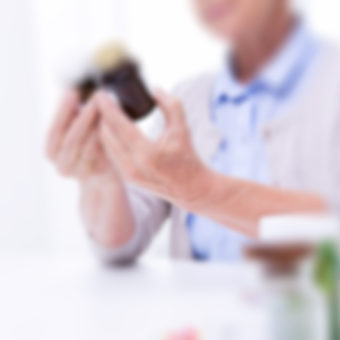

As a caregiver, you’re already juggling a lot. When you add household medication to the equation, it can be hard to keep up and properly managing that medicine is critical. When you administer medicine to someone else, there are a few important steps to take.
It’s critical that you adhere to the instructions provided with medicines, including labeling information and medication guides. The patient’s provider should be aware of the other medicines being taken and would have given you instructions based on this. Since each prescription varies, be careful to follow each specific set of instructions. Additionally, consolidating prescriptions at one pharmacy can save time and increase safety, as the pharmacist will see all of the drugs that are being prescribed.
To store their medicine, follow any storage instructions provided on the label and on the patient information accompanying the medicine; and keep it in a secure location, either in a medicine cabinet or safely away from people or pets that might come in contact with it.
While pill organizers can be convenient, mixing medicines often proves confusing to the patient and caregiver. By keeping household medicines in their original bottles, you’ll never have to guess which one is which. You’ll also avoid confusion about which ones can be taken with food or have other special instructions.
However, if a pill case is helpful to the patient, make sure that he or she is clear on which medicine is which; and remember that caregivers play a critical role in the proper administration of medicines, particularly for patients with any memory impairments. Your pharmacist may also be a helpful resource for recommending aids (such as pill cases, special alarms, or identifying bottle caps) that can help to remind you and your loved one to take their medicines.
No matter which method works best for you and the patient, the key takeaway is that establishing (and practicing) a system is a helpful way to organize medication information and adhere to the appropriate administration schedule.
Disposing of household medicines is easy: visit our Kiosk Site Locator to find a safe and secure kiosk site near you. Kiosk sites are often located in your local pharmacy or law enforcement facility, and are an anonymous and convenient way to securely dispose of your loved one’s unwanted, unused, or expired medicines.
Following these tips will help ensure that your loved ones get the optimal benefits from their medications – and the care that they need.

Make 2022 the year you focus on safe handling, storage, and disposal of your household medicines~ Ushering in a new…
Read More
Make it a habit to check your medicine cabinet ~ Ah, spring cleaning. That annual ritual when you throw open…
Read More
Can't make it to a kiosk site or take back event? ~ You’ve taken the steps needed to spring clean…
Read More
Prescription Medication Guides ~ It’s important to read the label of any medicine before use – but what about the…
Read More